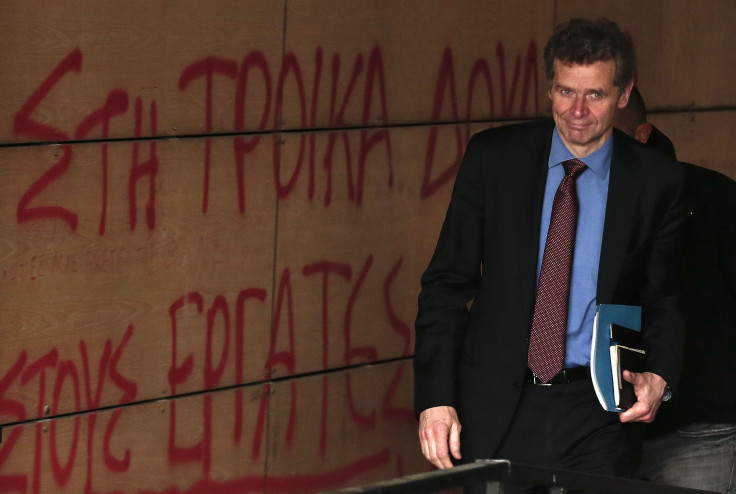In WikiLeaks Release, IMF Officials Discuss Bailing On Greek Bailout

UPDATE: 7 p.m. EDT -- Following the emergence of an apparently leaked transcript, the government of Greece on Saturday demanded that the International Monetary Fund explain talk of pulling out of the Greek financial bailout as a part of efforts to force European lenders to provide more debt relief, Reuters reported.
Lenders are scheduled next week to resume talks on the progress Greece has been making in getting its fiscal affairs in order.
Original story:
Greece’s top international lenders are quietly anticipating an “event” that would trigger a resolution to high-pressure debt talks that have gone on for six years. In a transcript of a purported teleconference released by WikiLeaks, two top officials at the International Monetary Fund discussed the intractability of the three-way negotiations, the potentially destabilizing effects of the European refugee crisis and Britain’s June vote over exiting the European Union.
In a conversation WikiLeaks said took place March 19, Poul Thomsen, the IMF’s European Department director, and Delia Velculescu, the head of the group’s mission to Greece, expressed deep skepticism a political resolution could be reached, floating the possibility the IMF would step away.
That possibility likely would provoke furor among the member states of the European Commission, particularly Germany, where Chancellor Angela Merkel has deemed IMF participation in Greek bailout discussions a must.
But the two officials — who have been insistent that Greece’s mountain of obligations requires substantial debt relief — imagined in frank terms a scenario that might allow the IMF to make an exit, according to the transcript provided by WikiLeaks.
In any case, the two officials predicted some political crisis would be necessary for the negotiations to find some balance between demands for Greece to make deep cuts to social spending in return for some measure of debt relief.
“What is going to bring it all to a decision point?” the transcript shows Thomsen asking. “In the past there has been only one time when the decision has been made, and then that was when they were about to run out of money seriously and to default.”
On one hand, this year could prove a repeat of 2015 when Greece warned it was unable to make debt payments due in July, forcing the European Commission, the IMF and the European Central Bank into dramatic last-minute bailout talks in July.
But outside complications abound. “Clearly the Europeans are not going to have any discussions for a month before the [Brexit],” Thomsen reportedly said, referring to the June 23 popular referendum in the U.K. over leaving the EU. “So, at some stage they will want to take a break and then they want to start again.”
But Thomsen imagined another possibility, in which the growing refugee crisis could force the Bundestag, the German Parliament, to reconsider its insistence that the IMF be involved in monitoring Greece’s bailout.
Thomsen imagined how the conversation might unfold. “Look, you, Ms. Merkel, you face a question. You have to think about what is more costly: to go ahead without the IMF — would the Bundestag say, ‘The IMF is not on board?’ — or to pick the debt relief that we think that Greece needs in order to keep us on board.”
In other words, Merkel would have to choose between instituting debt relief measures preferred by the IMF or allowing the IMF to exit the Greek bailout — both of which would create political uproar in Germany.
“I am surprised that it has not happened yet,” Thomsen said in the transcript. “For the sake of the Greeks and everyone else, I would like it to happen sooner rather than later.”
The release of the transcript already has shaken negotiations among Greece’s European lenders, which have resumed in light of growing evidence Greece will not be able to make budget goals laid out last year. At the center of talks is the subject of what level of government surplus Greece should be forced to target to pay back its debts.
Citing internal policy, the IMF refused to comment on the release. “We have stated clearly what we think is needed for a durable solution to the economic challenges facing Greece,” the IMF said in a statement. “There is a tradeoff between what is feasible on reforms and the amount of debt relief needed.”
Greece’s government, led by the combative left-wing Syriza party, reportedly convened an emergency meeting Saturday to discuss the WikiLeaks revelations.
The transcript has been variously interpreted. In the Greek government’s reading, the IMF looks to be pushing for a Greek default ahead of the Brexit vote in June. “The Greek government asks the IMF for explanations whether pursuing the creation of bankruptcy conditions in Greece, just before the British referendum, is the fund’s official position,” a Greek spokeswoman told the Financial Times.
In the transcript, however, the officials seemed unclear as to what would trigger a reckoning for Greece and its European creditors. “We need an event,” said Velculescu, according to the WIkiLeaks release. “But I don’t know what that will be.”
© Copyright IBTimes 2024. All rights reserved.






















